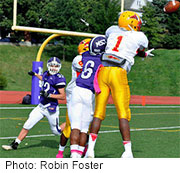No impairment of brain function seen over short term
TUESDAY, Jan. 13, 2015 (HealthDay News) — Children who play football in middle school don’t appear to have any noticeable short-term brain damage from repeated hits to the head, new research suggests. The report was published online recently in Medicine & Science in Sports & Exercise.
The study included 22 children, ages 11 to 13, who played a season of football. The season comprised 27 practices and nine games. During that time, 6,183 “head impacts” were recorded. They were similar in force and location to those experienced by high school and college players, but happened less often, the researchers found. For the study, players wore sensors in their helmets that measured the frequency of hits to the head, their location, and force. In addition, the children were screened before and after the season for factors such as balance, reading speed, reaction time, and self-reported symptoms.
The average number of head hits per practice was nine. During games, the number of head hits was 12, according to the researchers. Over a season, that worked out to approximately 250 hits to the head. One child suffered a concussion during the study. He wasn’t cleared to play again until the 27th day after his concussion.
“The primary difference between head impacts experienced by middle school and high school football players is the number of impacts, not the force of the impacts,” lead researcher Thayne Munce, Ph.D., associate director of the Sanford Sports Science Institute in Sioux Falls, S.D., told HealthDay. A season of football did not seem to clinically impair the brain function of middle school football players, even among those who got hit in the head harder and more often, Munce said. “These findings are encouraging for youth football players and their parents, though the long-term effects of youth football participation on brain health are still unknown.”
Full Text (subscription or payment may be required)
Copyright © 2015 HealthDay. All rights reserved.








